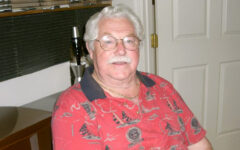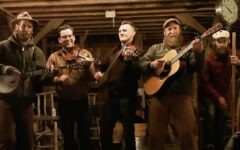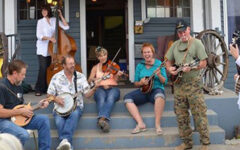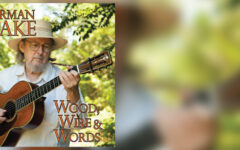
We have collected some memories from a few people who knew Dick Freeland well. Freeland passed away on August 14, 2014.
Long-time Bluegrass Unlimited contributor, Walt Saunders (he writes the column Notes and Queries) remembers Dick Freeland ………
“I first met Dick Freeland in 1966. He was not only one of the founders of Rebel Records, but also one of the original group (along with Pete Kuykendall, Dick Spottswood, Gary Henderson, Diane Sims and several others) that formed Bluegrass Unlimited in July 1966. I knew them all, and joined the staff of the magazine in June 1967.
At that time, Dick was running Rebel Records from the basement of his home in Hyattsville, MD. We had some meetings there, as I recall. He was a good business man, and was also a very funny guy—he had a wonderful sense of humor. He had a briefcase with a sign on it, ‘Dirty Old Men Need Love Too,’ that he carried around. That just broke me up every time I saw it. Once I asked him about the name Rebel Records, and if it was referring to the American Civil War and he said ‘No.’ He told me he got the name from the movie Rebel Without A Cause, starring James Dean.
I recall when he moved his operation to a warehouse in Mt. Rainier, Maryland, in about 1972. I visited there some, chatting with him and Ed Ferris who was working for him by then. Dick was planning to release some live recordings of the Stanley Brothers, and asked me if he could use a photo of them I took in Culpeper, Virginia in 1966. I told him, ‘Yes.’ He asked me how much money I wanted and I told him to forget it, just give me a copy of the album when it came out. He ended up releasing a Vol. 2 also, with the same picture. He gave me copies, and I have both to this day. I wasn’t about to take money from him—he was a good friend. Of course he was generous, and gave me copies of any Rebel releases that I wanted.
I think it was about 1972 when Dick accompanied Ralph Stanley and band (Roy Lee Centers, Jack Cooke, and Curly Ray Cline) to Japan for a tour. He was acting as manager, and made all the arrangements. When they all came back to the US, Pete Kuykendall and I met them at National Airport (now Reagan National Airport) in Arlington, Virginia. They had some great stories to tell of their trip, and Dick kept us in stitches with some of the funny things that happened. I think it was the following year that Dick took the Country Gentlemen to Japan on a tour. He also put together a tour of the US festival circuit by the Japanese band, Bluegrass 45, and released two albums by them.
I remember when Dick moved his operation to Asbury, West Virginia, I think around 1976 or 1977. I recall that he took Akira Otsuka with him, and maybe Ed Ferris too. It was a good move for him, but it was so far away. Of course, we visited often at festivals, but it was never quite the same after he moved from the Washington, DC area.
I was there in Asbury several times, and visited with him and his wife in their lovely country home. I visited him the last time when I accompanied Pete Kuykendall there when Pete bought Dick’s Zap Publishing Co. This would have been maybe 1979, shortly after Dick sold Rebel Records to Dave Freeman of County Records/County Sales. Dick was getting out of the music business. I think he was having too much fun riding his big farm tractor all around his farm. Of course he later started CRFRC Records, and released some Ralph Stanley material, as well as some other artists. We kept in touch for years via e-mails, and we’d send each other jokes a lot. But we hadn’t corresponded much in the last couple of years, and I suppose that was because of his health problems.
Dick will be sorely missed by those of us who knew him. And the loss of his son Ronnie a few days earlier makes the whole thing doubly sad.”
Multi-award winning musicologist, author and DJ Dick Spottswood, who co-founded Bluegrass Unlimited magazine, has some similar thoughts ……
“Dick was a big Papa Bear kind of guy who had a gift for both making things happen and for stepping to the side when they were happening on their own. He was devoted to bluegrass and brought considerable skill to recording and disseminating it during much of his life.
Dick wasn’t wealthy but he dedicated what resources he had into expanding a local fan-based record label into a critical resource for bluegrass when the music’s popularity was at an ebb. Dick was in the right place at the right time after the Country Gentlemen ended a five-year association with Starday in 1962. As Christmas approached, John Duffey and Ann Hill composed Christmas Time Back Home, a nostalgic song with musical references to Bill Monroe’s Christmas Time’s A-Coming. It did well enough to encourage Dick and the Gents to expand the relationship and they planned an LP of new material in 1963. The project was aborted when the Gentlemen signed with Mercury Records, and revived when the Mercury deal floundered in 1965.
Meanwhile, Dick Freeland created an unprecedented collection of Rebel odds and ends (including earlier singles and leftover session tracks), assembled on a 4-LP set that sold via mail for $4.98 over late night AM country radio, and earned Rebel some serious money. As Dick told Bill Vernon, it, ‘made us enough money that we were in a position, finally, to do what we pleased and we [were] pleased to do bluegrass.’
In 1965 the Gentlemen made an LP whose title track was Bringing Mary Home. It became a surprise hit and put both Dick and his label in high gear. Rebel soon could boast of a roster that included the Country Gentlemen, Jim Eanes, Emerson & Waldron, Buzz Busby, and, in the 1970s, Ralph Stanley with Roy Lee Centers, Keith Whitley and Ricky Skaggs, and the Seldom Scene.
Dick was a passive producer who knew enough to create an agreeable recording environment, and then stand aside while his artists were at work. He was a good businessman who nevertheless didn’t enrich himself at the cost of loyalty to the artists he worked with, and the good will he engendered was a major asset when Rebel merged with Dave Freeman’s County label in 1979.”
Gary Henderson, 1999 IBMA Broadcast Personality of the Year, has been involved in bluegrass programming at WAMU since 1967 (he inaugurated the first four-hour Sunday program of Stained Glass Bluegrass in September 1972). He recalls …………
“I first met Dick at his home, in his basement recreation room where Buzz Busby and Bill Carroll were rehearsing for a session. I can’t remember the circumstances that brought me there, unless Dick contacted me when I was working for a country station in Wheaton, Maryland. The station was owned by the Dillard Family, Everett and Jean. Ev was a respected broadcast consulting engineer. I only worked there for a little over two years, when they fired me for playing too much bluegrass. This was about the time Freeland issued the 4-LP set and sold it on WWVA, WCKY, and other all-nighters that were known for P.I. deals. The station was paid per inquiry from the listeners who purchased the record package or Red Top Baby Chicks, Bibles, or whatever. And the money went back to the advertiser and they shipped the goods to the listener. WDON sold the 4-LP set, too. Bill Carroll owned Carroll records that Buzz had a single on, and when Dick started Rebel, Bill was one of his partners. The first LP that Dick published was Bill Carroll and Mickey Burke.
Bluegrass Unlimited magazine grew out of an incident when I was working the mid-day shift at WDON. A listener, Dianne Sims called me and asked if I was aware the Stanley Brothers were playing at a bar in Maryland, the night before. I was stunned …. knew nothing about it, and the bar never bought any advertising. Pete Kuykendall had called me a few months earlier, and was impressed with the ‘mossy’ obscure bluegrass music I was playing. He invited me for lunch where he was working, at Electronic Wholesalers.
After Dianne called, I immediately called Pete, and he was just as stunned that none of the bluegrass fans knew of the Stanley booking. So we called a meeting with Dianne, Dick Freeland, Dick Spottswood, and Pete to consider publishing a local news calendar-journal so this incident would never repeat itself. To make a very long story short, Bluegrass Unlimited began as a mimeographed publication for the local Washington, DC metropolitan bluegrass fans. Before two or three months had passed, Dianne began receiving inquiries from England, Japan, and Germany. Before we knew it, it had blossomed into an international publication dedicated to the furtherance of bluegrass music.
Dick was a bit of a prankster, and pulled some stunts on Ed Ferris, who worked for him part-time, but for the life of me, can’t recall an exact incident. I used to give Freeland hell, for not mailing the newest 45 Rebel release or album to me or the station, (WAMU-FM). I had to drive over to his warehouse to pick them up myself, I fussed at him about that, all in good natured ribbing, and called him ‘cheap’ when radio talent had to drive to him to pick up his product to promote on the air. He finally talked Ed Ferris into visiting me on Saturday mornings with the latest releases.
The 70 Song Bluegrass Spectacular involved Dick pulling every bluegrass tape session he had in the vault, no matter the quality. He was gambling on Quantity, not Quality, and he was very successful with that record package. I never knew the financial amount, or how many he sold, but it was very impressive. He used that money to pay for future albums by the Country Gentlemen, Bill Emerson & Cliff Waldron, and Bennie & Vallie Cain.”
A researcher, musician, record producer, historian, award-winning writer, owner of a record company, and concert promoter, Gary B. Reid worked for Rebel Records from 1983 to 1996 …………
“I don’t really have any memories of Dick from my Maryland days. I got into bluegrass about 1973 or so, as a fan. It took me a little while to recognize that there were different record labels around, who ran them, and where they were located. Rebel’s home at that time was in Mt. Rainier, Maryland, which was not all far from where I grew up.
I have a vague recollection of driving through there, and being cognizant of the fact that that where Rebel was located. Oddly, the only thing that stands out to me about that trip was a rain storm. I was driving back home from Mt. Rainier, and as I was leaving the area, I went straight from a bone dry area into a wall of water. It was very distinct on the ground… like someone had marked it off with a line of chalk or something… step one way and it’s dry, step the other way and it’s wet. That was the first time I could recall having seen anything like that.
It wasn’t long after this that Dick moved to West Virginia and, of course, in 1979, he sold the label to Dave Freeman. When I went to work for Dave in 1983, I occasionally had reason to be in contact with Dick… with questions about where a missing LP master or photo might be, or recollections about a recording session, etc. The only time I was around him for any length of time was when I interviewed him for the boxed set of Country Gentlemen material on Rebel. He was very cordial, and candid, and gave me a lot of good information.
While I wasn’t always happy with the production values of the various albums he issued, Dick had a knack of attracting good talent and getting a lot of mileage out of his artists. In the middle 1960s, when Starday dropped its mantle for being the home for bluegrass, Dick positioned Rebel as ‘the’ bluegrass label. By the early 1970s, he had three of the biggest groups in bluegrass: Ralph Stanley, the Country Gentlemen, and the Seldom Scene. And, he was instrumental in breaking new groups, such as the Marshall Family, as well as catering to a host of mid-level groups like the Goins Brothers, Roy McMillan, A. L. Wood, etc. A number of groups he signed in the 1970s have gone one to become major headliners in the industry, namely Del McCoury and Larry Sparks.
I think that when Dick sold Rebel, he signed a 10-year no-compete clause, which he faithfully honored. But, when the term was up, he wasted no time in luring Ralph Stanley to his new Freeland Records label and scored a major success with the double disc, Saturday Night/Sunday Morning collection.
Although he hadn’t been active in the music for a number of years, no chapter on the history of bluegrass would be complete without an accounting of Dick Freeland’s fundamental role in the development or the bluegrass recording industry.”







